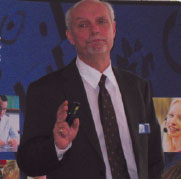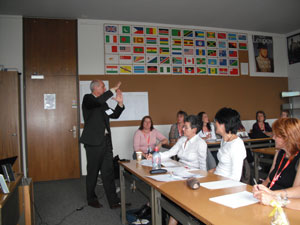About Gary Anderson

Gary Anderson was Pedagogical Director of the language program of the former American Center in Paris, and President-elect of TESOL France when he joined Cambridge ELT as International Teacher Trainer based in Paris.
He has given talks in over 50 countries on five continents, including at TESOL International and IATEFL UK. In this blog, Gary writes about the events he attends and shares some of the ideas and tips that he gives in his talks.
Blog posts
- On the Road with Gary Anderson in…Slovakia
- On the Road with Gary Anderson in …Italy
- On the Road with Gary Anderson in…Lithuania
- On the Road with Gary Anderson in…Romania, Greece and the Czech Republic
- On the Road with Gary Anderson in …Kazakhstan
- On the Road with Gary Anderson in …Switzerland
- On the Road with Gary Anderson in …Serbia
Gary's upcoming travels
- Romania: Cambridge Day, Bucharest; February 27
- Poland: Workshops in Katowice, Krakow, Szczecin, Gdansk; March 10–17
- Bosnia: Workshops in Mostar and Bijeljina; March 25–26
- Croatia: Workshops in Slavonski Brod and Osijek; March 29–30
- UK: IATEFL, Harrogate; April 7–11
- Russia: Workshops in Moscow, Nizhni, Saratov; April 11–15
- Belgium: Cambridge Day, Brussels; April 24
- Netherlands: English for Schools Day, Utrecht; April 28
Sign up for RSS feed
Read Gary's latest blog post as soon as it appears!
Blogs by Cambridge authors
Follow your favourite Cambridge authors here:
- DCBlog, David Crystal
- Bob Dignen's blog on Professional English Online
- That'SLife, Gavin Dudeney
- Andy Hockley's blog
- The Spelling blog, Johanna Stirling
On the Road with Gary in …Switzerland
Switzerland, the home of a strong economy but with many a 'challenged' bank,
Has also a professional teachers' organization of the highest rank–
The English Teachers Association Switzerland, or ETAS–
At whose annual SIG Day I gave two talks: one pretty fast
And another whose ideas will hopefully compound in interest and last.
ETAS is an impressive teachers' association with both an annual conference and an annual SIG (Special Interest Group) Day held this year on Saturday, September 12 in the premises of Gymansium Bäumlihof in Basel and attended by nearly 300 teachers from around the country who chose from among three concurrent sessions in twelve (!) different SIG streams and even talks during the lunch break. The event finished with a generous prize draw (and some Scottish folk dancing) during a nice closing cocktail.

I did two presentations: First, a short talk at lunchtime on 'Techniques and Technology to Teach – and Learn – face2face' on the new Starter and Advanced levels of face2face and on the Classware accompanying each of the six levels of the course. And then a longer workshop which served as a combined presentation for both the Teen and the Drama & Literature SIGs entitled 'Literary Tools for Teaching Teenagers; or, Fitting Round Pegs into Square Holes'.
Let me explain the title. I was touring in Belgium a few years ago with Mario Rinvolucri who was working on Ways of Doing in the Cambridge Handbooks for Language Teachers series and Mario tried out an activity on me to test my 'metaphoric intelligence'. Itís called 'proverb reversal': You take a proverb, reverse the words and think of a context. For example, 'Necessity is the mother of invention' becomes 'Invention is the mother of necessity' and the context could be, well, could you live without a mobile phone? So the proverb 'As difficult as fitting square pegs into round holes' becomes 'As difficult as fitting round pegs into square holes'. For teachers, the context would be trying to fit a class into a coursebook or any individual student into a class. To do that you need… 'tools for teachers', ie. supplementary materials from publishers plus your own activities. Because you don't, of course, teach just the coursebook; you teach the class!
So in a packed classroom thirty-two teachers and myself tried out activities from various Cambridge ELT materials for teenagers – new secondary titles in the Cambridge Copy Collection, including Teen World; the Cambridge School Dictionary; and especially Cambridge Discovery Readers for extensive 'pleasure' reading for teenagers – as well as a couple of activities of my own. The idea was, to somewhat reverse a Beatles' tune: 'Got to get you into their lives!'.
Someone had added 'Literary' to the title of my workshop and I tried to oblige by quoting from Proust's On Reading, from Diderot's Jacques and the Fatalist about the similar mind set of teenagers even in the 18th century (!) and especially from Maryann Wolfe's recent Proust and the Squid (which Philip Prowse, the Series Editor of Cambridge English Readers, recommended to me – and I highly recommend to you) on the evolution of the human 'reading' brain. BTW: Ms Wolfe postulates that the brain will evolve so that even 'screen-agers' (as teenagers are sometimes called), who read more on screen than in books, will continue reading.
What about you? What supplementary materials and activities do you use to make it 'easier fitting your teenage students (the round pegs) into your coursebook and classes (the square holes)'?
Gary Anderson, Cambridge ELT International Teacher Trainer


